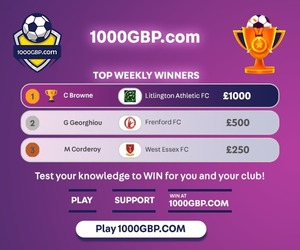It’s a tough job being an accountant for non-league clubs. They are run on shoestring budgets. The F.A. Cup is a romantic competition which, yes, gives them a chance at glory, to upset the odds and take on the big teams, but, also, gives them the chance at earning revenue which helps them keep on ticking over. These single-elimination matches have huge consequences. It’s important for them to find these extra pockets of money so they move into or stay in the black.
What the internet has provided for many companies and individuals is the chance to build a brand, increase their exposure, and monetise content and collaborations to the point where living off this income is a genuine reality. Can non-league clubs look to these enterprises and endeavours for inspiration?
Social Media Brand
Hashtag United have had an unconventional and unique journey to the lower pyramids of English football. Spencer Carmichael-Brown played in a five-a-side, seven-a-side, and eleven-a-side team named after himself, recording and uploading the matches to YouTube. Followers quickly found his social media pages. He had a viral ‘penalty challenge’ video which helped propel their channels to new heights and new exposure. Exhibition matches were arranged against teams of comedians, a team of Manchester City staff, the GB Deaf Team, and Barawa. Ex-pros like Ray Parlour and Paul Dickov have played against Hashtag United in these fixtures. Their profile grew and grew. Carmichael-Brown eventually completed talks with the FA to join the non-league pyramid. They have half-a-million subscribers on YouTube.
Their content on YouTube earns them revenue from the platform’s ad revenue service. This exposure earns them sponsorships opportunities which they wouldn’t have otherwise attracted – Football Manager, Lucozade, and, notably, Adidas all give their names and money to the club.
Sponsorships are a huge part of offline and online brands. They enable growth and they offer security. Hashtag United’s online brand can continue to grow. It’s likely they’d need another viral video or an investment in an initiative which pushes them further. Becoming a sponsor themselves or investing in streamers/personalities to represent them could be one way. For instance, GGPoker sponsors events and streamers, boosting their profile and exposure, which, in turn, sees audiences visit their site to play games like GGPoker Flip & Go. It’s an ecosystem. Hashtag United have an esports team, so they could see growth via this route.
Their on-field performance could become a less of a key barometer for success than any other football club.
Documentary Productions
A-list actor Ryan Reynolds and creator/star of It’s Always Sunny in Philadelphia Rob McElhenney have bought Wrexham A.F.C.. They had to do some convincing that this was a serious endeavour and it seems to be working. Their mission statement was fairly simple: Wrexham A.F.C. will become a global force. What attracted them to the club was that it was the centre of the town’s community, and this is something they intend to help blossom. They’ve appointed Fleur Robinson to become CEO, beginning at the start of June 2021, who has a history of turning non-league clubs into Championship clubs after her stint at Burton Albion.
The new owners have committed to investment. This is important, obviously. It will give the club a good foundation to become self-sustaining. The owners’ profile turned Wrexham A.F.C. into a global team overnight. They will attract sponsorships. However, one of the key things they’ll be able to do is to use their platform to generate commercial interest within the film and TV industry. Reynolds and McElhenney have sent cameras to the town to record the the club’s season, as well as the relationship the community has with the club, in the hopes of turning the material into a documentary series for the likes of Amazon or Netflix, which can attract upwards of half-a-million pounds or more per episode, which will be an invaluable revenue stream for the club as they begin their ascent into the professional leagues.
The approaches these two clubs have to ensuring and expanding their futures are likely to be isolated events. To be sure, not every team can have a successful online campaign or Hollywood owners, just as not every team can have a successful F.A. Cup run. Are there other lessons to take from their examples other than diversifying their interests, or should football’s business face new scrutiny?






















